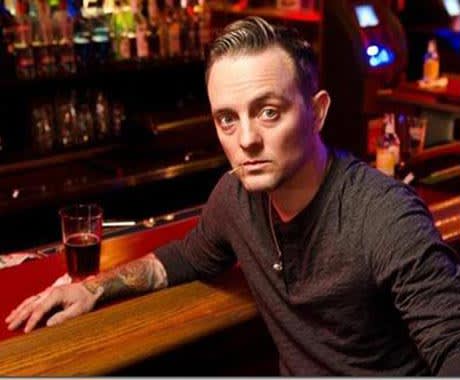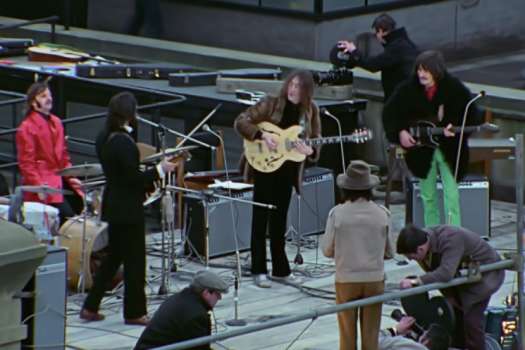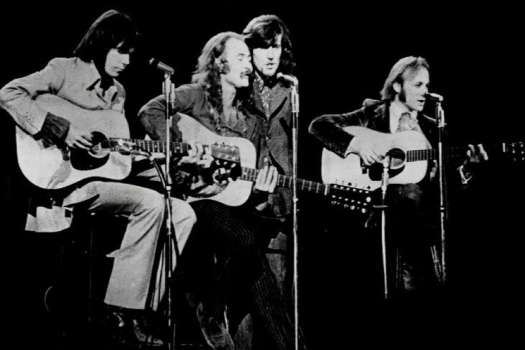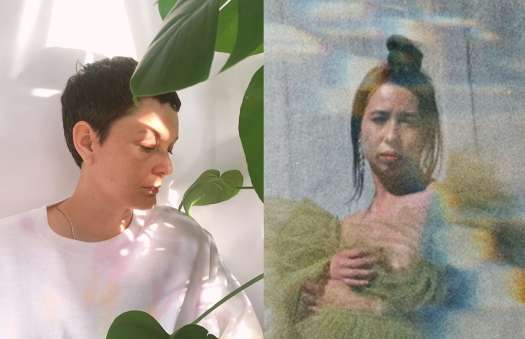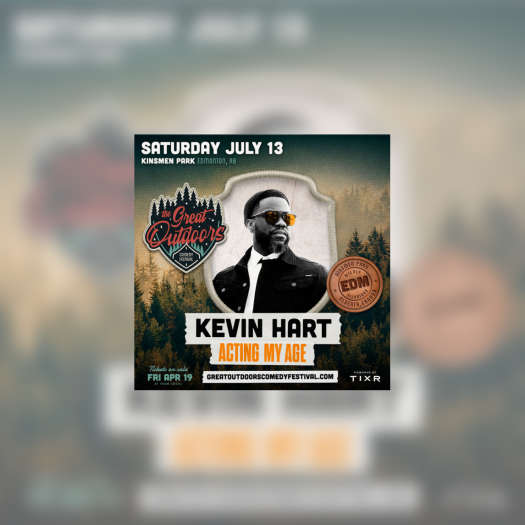Rough and tumble singer-songwriter Dave Hause tapped a wide array of studio musicians and guests for his second solo album, Devour, which he refers to as a "bloodletting." As previously reported, the 12-song album from Hause — often the show-stealer in Chuck Ragan's long-running "Revival Tour" — arrives Tuesday (October 8) via Rise Records. But as Hause explains, the new album was originally meant to be the third full-length by his former band, Philadelphia melodic punkers the Loved Ones.
"The band was a little stalled out and a little burned out when I wrote [2011 solo album] Resolutions, so I just I figured I would go out on tour and see what happened," Hause tells Exclaim! from his new home in Santa Barbara, CA. "It ended up being two years of my life on the road and it rejuvenated my career in music. And Devour, the new record, is essentially what the third the Loved Ones record was going to be. I just took the songs for myself and fully fleshed them out and went forward."
With the help of co-producers Mitchell Townsend and Andrew Alekel, and with a studio band that included Townsend on guitar, My Morning Jacket keyboardist Bo Koster and former Big Drill Car bassist Bob Thomson, as well as guest appearances by the likes of the Watson Twins, Scott Hutchison of Frightened Rabbit and Matt Skiba of Alkaline Trio, the album is a veritable cornucopia of underground rock talent. Add to the mix Social Distortion drummer Dave Hidalgo ("He's absolutely, hands-down the best drummer I've ever played with; he's unbelievable," enthuses Hause), and it's a collection of songs just teeming with musicality.
"Everyone brought an enormous amount to the table, but the real secret ingredient, band-wise, was Bo," explains Hause. "Bo was someone I wanted to play on the record before even knowing that Mitchell knew him. I'd just been such a huge fan of that band and his contribution to that band; I think he's their secret weapon as well... He was like the icing-on-the-cake guy."
A darker, more pensive and melancholic album than its predecessor, Resolutions, the new album is 12 songs that detail Hause's painful journey through a divorce and choosing a life on the road that left many of his friends and family behind.
"Pensive is definitely a good word for it," he says. "The new record was coming out of a lot more dark stuff than Resolutions was, and coming to grips with that mid-'30s adult crash and figuring out how you got here, and where you even are, and where you're trying to go. So that's the framework of the record. It came from that darker place, and it's about the journey to figure it out and get out of there."
Devour is also a tip of the hat to the newfound balance in Hause's life. After spending two years on tour during a huge crossroads in his life, the Philadelphia-raised musician — who had previously spent countless years on the road in punk bands such as Paint It Black and the Curse, and as a roadie for bands like Kid Dynamite — has finally found a way to prioritize his life in a way that makes sense to him.
"The older you get, if you're trying to be a creative person, or if you're life is related to the arts in any way, it's about steering that balance," he says. "You can't go too far in one direction without really wrecking another facet of your life, so I feel like I'm finding that balance by simplifying my life and being a solo performer and guy who doesn't really rely on a band. I can bring a band if I want, but I don't really have to have that weight on my shoulders anymore."
As for the Loved Ones, Hause says the only way they would ever play another show would be if it was for a really good cause, explaining that the other members of the band have moved on. And while he won't be bringing his Devour studio musicians on the road with him for an upcoming North American tour, Hause says the experience of recording the album was invaluable for his solo career.
"I was finished writing the record when we walked in the door of the studio, but the recording of the album was critical to the way we structured it. I view songwriting as one thing, recording as a totally different art, and then playing shows as a totally different thing. And you need different skill sets and different approaches to do each thing. So, for me, to really give over a lot of the control of the recording and the playing on the record was great, because I think we got a sum that was greater than its parts.
"I mean, those songs will translate directly with one instrument and a vocal, and I made sure I did good work in the writing… it was like bloodletting writing this record, but to really get the songs to shine beyond just demo versions, everyone's added contributions made it something incredible that I couldn't have done on my own."
"The band was a little stalled out and a little burned out when I wrote [2011 solo album] Resolutions, so I just I figured I would go out on tour and see what happened," Hause tells Exclaim! from his new home in Santa Barbara, CA. "It ended up being two years of my life on the road and it rejuvenated my career in music. And Devour, the new record, is essentially what the third the Loved Ones record was going to be. I just took the songs for myself and fully fleshed them out and went forward."
With the help of co-producers Mitchell Townsend and Andrew Alekel, and with a studio band that included Townsend on guitar, My Morning Jacket keyboardist Bo Koster and former Big Drill Car bassist Bob Thomson, as well as guest appearances by the likes of the Watson Twins, Scott Hutchison of Frightened Rabbit and Matt Skiba of Alkaline Trio, the album is a veritable cornucopia of underground rock talent. Add to the mix Social Distortion drummer Dave Hidalgo ("He's absolutely, hands-down the best drummer I've ever played with; he's unbelievable," enthuses Hause), and it's a collection of songs just teeming with musicality.
"Everyone brought an enormous amount to the table, but the real secret ingredient, band-wise, was Bo," explains Hause. "Bo was someone I wanted to play on the record before even knowing that Mitchell knew him. I'd just been such a huge fan of that band and his contribution to that band; I think he's their secret weapon as well... He was like the icing-on-the-cake guy."
A darker, more pensive and melancholic album than its predecessor, Resolutions, the new album is 12 songs that detail Hause's painful journey through a divorce and choosing a life on the road that left many of his friends and family behind.
"Pensive is definitely a good word for it," he says. "The new record was coming out of a lot more dark stuff than Resolutions was, and coming to grips with that mid-'30s adult crash and figuring out how you got here, and where you even are, and where you're trying to go. So that's the framework of the record. It came from that darker place, and it's about the journey to figure it out and get out of there."
Devour is also a tip of the hat to the newfound balance in Hause's life. After spending two years on tour during a huge crossroads in his life, the Philadelphia-raised musician — who had previously spent countless years on the road in punk bands such as Paint It Black and the Curse, and as a roadie for bands like Kid Dynamite — has finally found a way to prioritize his life in a way that makes sense to him.
"The older you get, if you're trying to be a creative person, or if you're life is related to the arts in any way, it's about steering that balance," he says. "You can't go too far in one direction without really wrecking another facet of your life, so I feel like I'm finding that balance by simplifying my life and being a solo performer and guy who doesn't really rely on a band. I can bring a band if I want, but I don't really have to have that weight on my shoulders anymore."
As for the Loved Ones, Hause says the only way they would ever play another show would be if it was for a really good cause, explaining that the other members of the band have moved on. And while he won't be bringing his Devour studio musicians on the road with him for an upcoming North American tour, Hause says the experience of recording the album was invaluable for his solo career.
"I was finished writing the record when we walked in the door of the studio, but the recording of the album was critical to the way we structured it. I view songwriting as one thing, recording as a totally different art, and then playing shows as a totally different thing. And you need different skill sets and different approaches to do each thing. So, for me, to really give over a lot of the control of the recording and the playing on the record was great, because I think we got a sum that was greater than its parts.
"I mean, those songs will translate directly with one instrument and a vocal, and I made sure I did good work in the writing… it was like bloodletting writing this record, but to really get the songs to shine beyond just demo versions, everyone's added contributions made it something incredible that I couldn't have done on my own."
